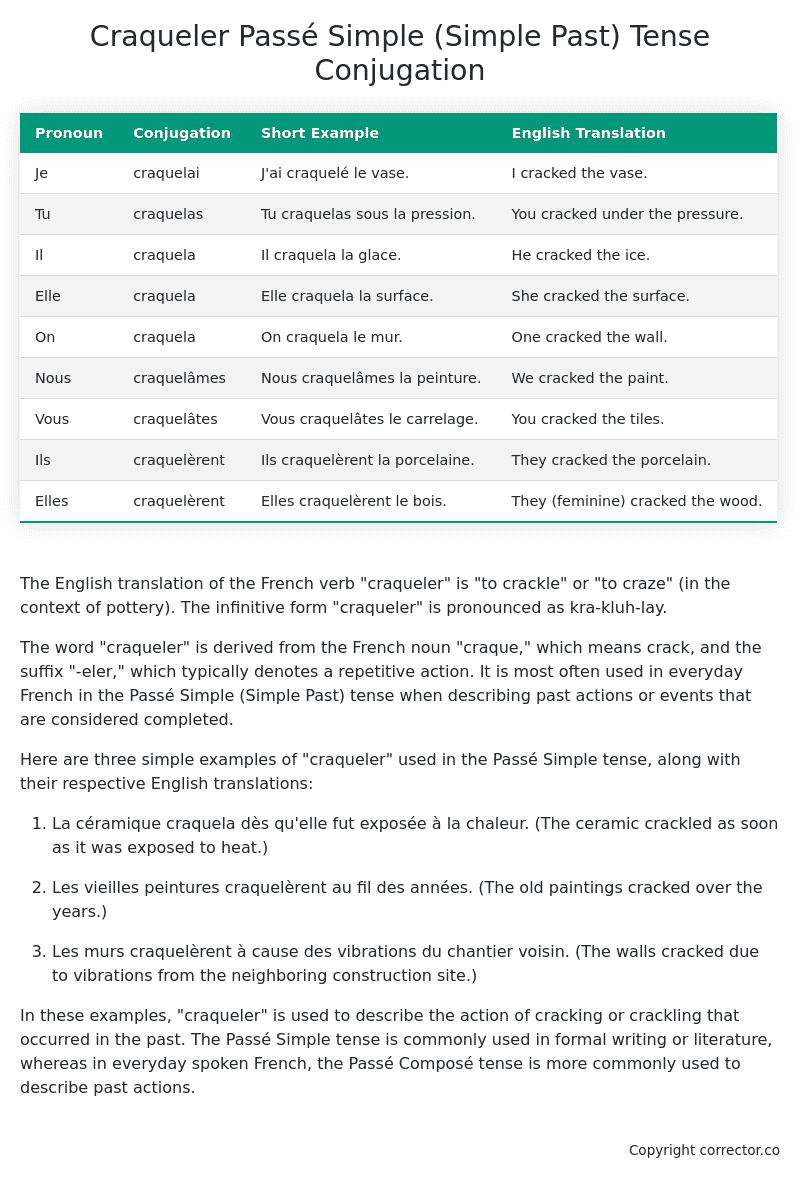Passé Simple (Simple Past) Tense Conjugation of the French Verb craqueler
Introduction to the verb craqueler
The English translation of the French verb “craqueler” is “to crackle” or “to craze” (in the context of pottery). The infinitive form “craqueler” is pronounced as kra-kluh-lay.
The word “craqueler” is derived from the French noun “craque,” which means crack, and the suffix “-eler,” which typically denotes a repetitive action. It is most often used in everyday French in the Passé Simple (Simple Past) tense when describing past actions or events that are considered completed.
Here are three simple examples of “craqueler” used in the Passé Simple tense, along with their respective English translations:
-
La céramique craquela dès qu’elle fut exposée à la chaleur.
(The ceramic crackled as soon as it was exposed to heat.) -
Les vieilles peintures craquelèrent au fil des années.
(The old paintings cracked over the years.) -
Les murs craquelèrent à cause des vibrations du chantier voisin.
(The walls cracked due to vibrations from the neighboring construction site.)
In these examples, “craqueler” is used to describe the action of cracking or crackling that occurred in the past. The Passé Simple tense is commonly used in formal writing or literature, whereas in everyday spoken French, the Passé Composé tense is more commonly used to describe past actions.
Table of the Passé Simple (Simple Past) Tense Conjugation of craqueler
| Pronoun | Conjugation | Short Example | English Translation |
|---|---|---|---|
| Je | craquelai | J’ai craquelé le vase. | I cracked the vase. |
| Tu | craquelas | Tu craquelas sous la pression. | You cracked under the pressure. |
| Il | craquela | Il craquela la glace. | He cracked the ice. |
| Elle | craquela | Elle craquela la surface. | She cracked the surface. |
| On | craquela | On craquela le mur. | One cracked the wall. |
| Nous | craquelâmes | Nous craquelâmes la peinture. | We cracked the paint. |
| Vous | craquelâtes | Vous craquelâtes le carrelage. | You cracked the tiles. |
| Ils | craquelèrent | Ils craquelèrent la porcelaine. | They cracked the porcelain. |
| Elles | craquelèrent | Elles craquelèrent le bois. | They (feminine) cracked the wood. |
Other Conjugations for Craqueler.
Le Present (Present Tense) Conjugation of the French Verb craqueler
Imparfait (Imperfect) Tense Conjugation of the French Verb craqueler
Passé Simple (Simple Past) Tense Conjugation of the French Verb craqueler (You’re reading it right now!)
Passé Composé (Present Perfect) Tense Conjugation of the French Verb craqueler
Futur Simple (Simple Future) Tense Conjugation of the French Verb craqueler
Futur Proche (Near Future) Tense Conjugation of the French Verb craqueler
Plus-que-parfait (Pluperfect) Tense Conjugation of the French Verb craqueler
Passé Antérieur (Past Anterior) Tense Conjugation of the French Verb craqueler
Futur Antérieur (Future Anterior) Tense Conjugation of the French Verb craqueler
Subjonctif Présent (Subjunctive Present) Tense Conjugation of the French Verb craqueler
Subjonctif Passé (Subjunctive Past) Tense Conjugation of the French Verb craqueler
Subjonctif Imparfait (Subjunctive Imperfect) Tense Conjugation of the French Verb craqueler
Subjonctif Plus-que-parfait (Subjunctive Pluperfect) Tense Conjugation of the French Verb craqueler
Conditionnel Présent (Conditional Present) Tense Conjugation of the French Verb craqueler
Conditionnel Passé (Conditional Past) Tense Conjugation of the French Verb craqueler
Conditionnel Passé II (Conditional Past II) Tense Conjugation of the French Verb craqueler
L’impératif Présent (Imperative Present) Tense Conjugation of the French Verb craqueler
L’impératif Passé (Imperative Past) Tense Conjugation of the French Verb craqueler
L’infinitif Présent (Infinitive Present) Tense Conjugation of the French Verb craqueler
L’infinitif Passé (Infinitive Past) Tense Conjugation of the French Verb craqueler
Le Participe Présent (Present Participle) Tense Conjugation of the French Verb craqueler
Le Participe Passé (Past Participle) Tense Conjugation of the French Verb craqueler
Struggling with French verbs or the language in general? Why not use our free French Grammar Checker – no registration required!
Get a FREE Download Study Sheet of this Conjugation 🔥
Simply right click the image below, click “save image” and get your free reference for the craqueler Passé Simple tense conjugation!

Craqueler – About the French Passé Simple (Simple Past) Tense
Formation
Usage
Narration
Historical Context
Interactions with other tenses
Passé Composé
Imparfait
Conditional and Subjunctive
Summary
I hope you enjoyed this article on the verb craqueler. Still in a learning mood? Check out another TOTALLY random French verb conjugation!


